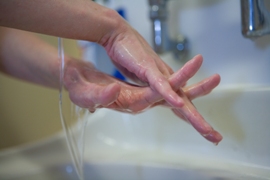Norovirus – useful information
 Please find below some information about norovirus and the steps you can take to prevent infection.
Please find below some information about norovirus and the steps you can take to prevent infection.
-
What is norovirus?
Noroviruses are a group of viruses that are the most common causes of gastroenteritis (stomach bugs) in England and Wales. Norovirus is also known as the ‘winter vomiting bug’, ‘small round structured virus’ or ‘Norwalk-like virus’.
Norovirus often causes outbreaks because it is easily spread and is able to survive in the environment for many days. Outbreaks commonly occur in semi-closed environments such as hospitals, nursing homes, schools and cruise ships, where people are in close contact with one another for long periods.
It is estimated that up to one million people get infected each year in the UK.
-
How is norovirus spread?
Norovirus is easily spread from one person to another. It can be transmitted by contact with an infected person, by consuming contaminated food or water, or by contact with contaminated surfaces or objects.
The infection dose is very low; swallowing as few as 10 to 100 virus particles may be enough to cause illness.
-
What are the symptoms?
The most common symptoms of norovirus are:
- Nausea
- Vomiting
- Watery diarrhoea
- Stomach cramps
- Raised temperature
- Headaches
- Aching limbs
However, not all those infected will experience all of the symptoms.
Symptoms usually begin around 12 to 48 hours after becoming infected, and can last for 12 to 60 hours. Most people make a full recovery with in one or two days.
However some people (usually the young or the elderly) may become dehydrated and require hospital treatment. It is worth noting that the patient is infectious for up to 48 hours after the symptoms have resolved.
-
How is norovirus treated?
There is no specific treatment for norovirus apart from letting the illness run its course. It is important to drink plenty of fluids to prevent dehydration. There are no long-term effects from norovirus.
-
What can I do to prevent the spread of norovirus?
- Good hygiene, such as frequent hand washing with soap and water, is very important.
- Disinfection of contaminated areas for up to 48 hours after the symptoms have subsided, for example cleaning toilets after use, cleaning all surfaces after touching them and not preparing food.
- The infected person is also advised not to receive visitors or to visit others for up to 48 hours after the symptoms have subsided.
-
What precautions do we take as an ambulance service?
As an ambulance service we remain fully committed to ensuring that all our patients receive care in a clean and safe environment.
We take infection prevention and control seriously and have implemented policies and procedures to minimize the risk of infections.
All our staff have been trained in hand hygiene and issued with alcohol hand rub to ensure they can always clean their hands in between patients. They also ensure that the ambulance is cleaned appropriately after each patient.
-
More about preventing infections
For more information about what we do to prevent infections see clostridium difficile or MRSA.

Follow us on social media: